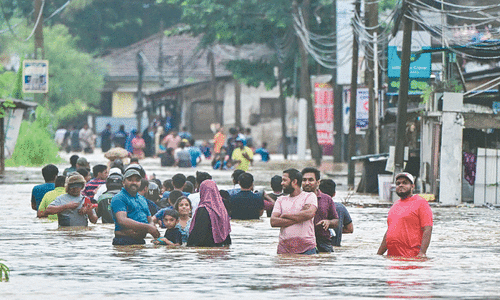COLOMBO, June 1: Sri Lanka’s peace prospects have dimmed as Tamil Tiger rebels resist international pressure and insist on political power ahead of a final settlement, diplomats and officials said Sunday.
After labelling six rounds of negotiations with the Colombo government as a “waste of time,” the Liberation Tigers of Tamil Eelam (LTTE) on Friday rejected an offer of greater financial authority in return for ending their boycott of peace talks.
“The Tigers are making a serious miscalculation by not attending talks, and particularly the donors meeting in Tokyo,” a senior western diplomat here said referring to the aid pledging conference Japan is hosting on June 9-10.
The diplomat said the Tigers may be underestimating the will of the United States, European nations, Japan and neighbouring India in strongly backing the Norwegian-led peace initiative to end Sri Lanka’s ethnic bloodshed.
However, the LTTE’s London-based chief negotiator, Anton Balasingham, said Friday the rebels were unhappy with the international community’s increased role in Sri Lanka.
“We are also concerned over the growing involvement in the peace process of formidable international forces from whom you have been soliciting not only aid but the setting up of a grand international ‘safety net’ to bring undue pressure on the freedom of our people to determine their political status and destiny,” Balasingham said in a letter to Prime Minister Ranil Wickremesinghe.
The LTTE pulled out of peace talks on April 21 and since then there have been growing demands, including from the G8 foreign ministers, that the Tigers resume talks and attend the Tokyo donors conference.
The Tigers, who declared a truce in December 2001, criticised the international community for treating them “shabbily”.
Four previous bids for peace since 1985 have ended in failure and led to more bloodshed in a country where more than 60,000 people have been killed in fighting since 1972.
Asian diplomats said prospects of an early resumption of peace talks were dashed Friday when the LTTE rejected the government’s offer to give them greater financial authority.
The LTTE insisted it needed an “interim administrative structure,” or an effective mechanism to give it political power in the war-torn northern and eastern regions before a final peace settlement.
Asian diplomats said the latest LTTE demand was also placing increased pressure on the cohabitation government of Wickremesinghe, who faces a hostile president who has hinted that the government may be sacked.
The president’s party is about to clinch a deal with the main Marxist group in parliament as a first step to toppling the government which has a slender two-seat majority in the 225-member national parliament.
“It is bad news on two fronts for the government, the talks are not going well and the president is sharpening her daggers,” an Asian diplomat said.—AFP











































Dear visitor, the comments section is undergoing an overhaul and will return soon.